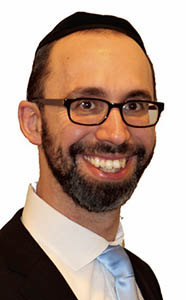
Imagine the scene: All of Yaakov’s children surrounding the coffin of their beloved father, standing reverently, tearfully, at the entrance to the Mearat HaMachpela…and in the opening to the cave stands Uncle Esav with a big sword in his hand. “Yaakov buried here?” he thunders, “Over my dead body! If I couldn’t have the firstborn privileges when Yaakov lived, at least I’ll have them now that he’s dead. I will be buried within the cave, not Yaakov!”
“But Uncle, you sold the bechora (birthright) to your brother, our father, Yaakov.” “No, I didn’t, never.” “Uncle! We have a contract with your signature.” “Really? Let me see it.” “We don’t have it with us; it’s in Mitzrayim.” “Haha!” gloats Esav, “no contract—no burial!”
No problem…Naftali runs like a deer back to Mitzrayim to retrieve the document needed to bury his beloved grandfather. However, not everyone is so patient. Along comes Chushim, the son of Dan, who is deaf. “What’s holding things up?” he asks. The family explains the situation. “What?! The body of my grandfather, Yaakov HaTzadik, is lying here in disgrace and this rasha is delaying the burial with technicalities?!” He picks up a stick and hits Esav on his head, which flies off and rolls into the Mearat haMachpela.
If you weren’t familiar with this famous Midrash, you will be when you have school-age children, who will tell it to you with even more excitement and glee. But a Midrash is a deep, God-given treasure trove of wisdom, so we must ask the obvious questions: Why did only Chushim have this deep feeling that caused him to act? Didn’t Yaakov’s own sons have this sensitivity?
This reminds me of a story I read. In 1970, at the peak of (modern) communist anti-Semitism, a young Russian Jew was allowed to leave for Eretz Yisrael after waiting for years to leave and be free to practice Judaism. Finally, the plane lands in Lod! He gets off the plane, sees a Jewish security guard, and runs over to him with book in hand. He grabs him by the lapel of his jacket and says, “Tell me, tell me the explanation of this Gemara!” The secular security guard looks at him as if he landed from the moon. “Why are you asking me? How should I know?” The Russian man stares back in disbelief. He thinks, “Can there be Jewish people who have the freedom to study Torah…and don’t?”
Rav Chaim Shmulevitz, famed rosh yeshiva of the Mir Yeshiva, explains the lack of sensitivity in Yaakov’s sons. Hashem gave humans an incredible ability to adapt to situations very quickly and to accustom themselves to new circumstances. It’s a quality that we need in life to cope with adverse circumstances. If we unfortunately have to share sad news of someone’s passing, we break it slowly, but it’s incredible how quickly the recipient of bad news becomes acclimated in a very short time. Yet, this ability also has its downside. We can lose our sensitivity to a situation, to a behavior or to actions that we felt were abhorrent, by becoming used to them. Quickly they become “the way it is,” common and not so upsetting.
Everyone involved in the dialogue with Esav came up with a practical solution to the burial dilemma: no problem, we’ll just get the contract. See what happened! In those few minutes of dialogue with Esav, they lost the sensitivity, the sense of outrage that their holy, beloved father, Yaakov, would lay unburied for a day. Meanwhile, Chushim did not engage in this dialogue (because of his deafness), so he saw the issue with all its implications.
This is a challenge that we face daily. We have become accustomed to many situations and values that we initially felt were despicable, but we have become desensitized over time and we now feel they’re tolerable. Relationships that the Torah declares “abominations” have gradually become socially accepted by the world, and slowly this social acceptance creeps into our own thinking and the relationships begin to lose their horror and detestable status. That’s the effect of acclimation.
What can we do about this phenomenon? If we want to preserve the sensitivity that comes with our value system, we need to constantly review and strengthen our values. The only way to do that is by studying Torah, particularly with a rebbe, and to surround ourselves with a community of people dedicated to spiritual growth and serving Hashem by using His values.
The New York Metropolitan Transportation Authority and Homeland Security have a slogan: “If you see something, say something!” Maybe we can adapt this to our own, higher needs; maybe we should start thinking, “If we feel something, do something!” When we perceive something is not right according to Torah values, we should bring it to our conscious attention and determine what we can do about it. Even if we can’t change a thing, at least we won’t let ourselves be brainwashed into thinking it’s acceptable.
By Rabbi Baruch Bodenheim
Parshat Vayechi













